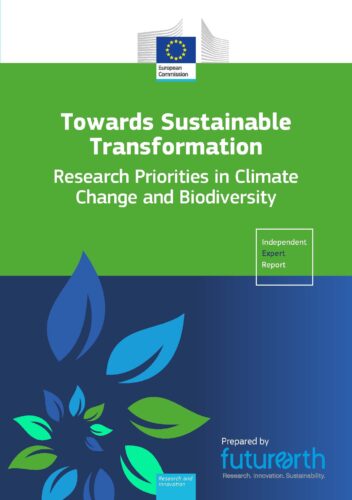Three elements – transdisciplinarity, a systems approach, and transformation of how institutions conduct and fund research – will be critical to address climate change and biodiversity loss in the coming years, concludes a new report from the Future Earth community.
The expert report –Towards SustainableTransformation – Research Priorities in Climate Change and Biodiversity – gathered over 120 community inputs from multiple scientific disciplines and was launched June 11 at the European Commission Delegation Office in Helsinki in parallel to the 2024 Sustainability Research and Innovation Congress.
The European Commission Directorate-General for Research and Innovation, Philippe Tulkens, invited Future Earth to issue this independent expert report to inform the European Union’s €95 billion flagship research funding program, Horizon Europe, for 2025 and beyond. Tulkens also spoke at the launch event. The aim of the report is to provide recommendations to the European Commission and any other relevant research and funding entities on what climate change and biodiversity research must prioritize in the near-term to maximize the societal relevance and impact of public funds.
Bridging research gaps for a sustainable future
In the report, researchers from around the world highlight key questions and research gaps that may have the greatest impact on accelerating an evidence-based sustainability transition. The three cross-cutting elements in all chapters, transdisciplinarity, a systems approach, and the need for transformation in research, are emphasized across such topics such as planetary health, societal values, governance, the role of policy instruments, the use of big data and emerging tools, and new paradigms of science information exchange. These chapter themes and questions represent a departure from traditional academic methodologies. They necessitate the collaboration of interdisciplinary teams, involving scientists from all backgrounds, including social sciences and humanities, and require academic institutions to evolve in their capacity to engage with policy makers and stakeholders effectively.
The report emerged from a year-long consultative and participatory process. Synthesis of the over 120 inputs received from respondents revealed a remarkable degree of consensus regarding the overall scope and mode of research that will be needed to address the challenges of climate change and biodiversity loss.
“The report highlights two things in particular: First, both climate change and biodiversity loss are driven by unequal consumption and natural resource use patterns globally. Second, the impacts of climate change and degradation of living environments of people are also experienced highly unequally with those most vulnerable bearing the brunt of negative changes,” Sirkku Juhola, Emergent Risks and Extreme Events Global Research Network member and report chapter lead said at the launch. “Policy solutions have to address both with a clear focus on identifying ways to address both with an equitable way to share the burdens and the benefits.”
Credit: Source link




